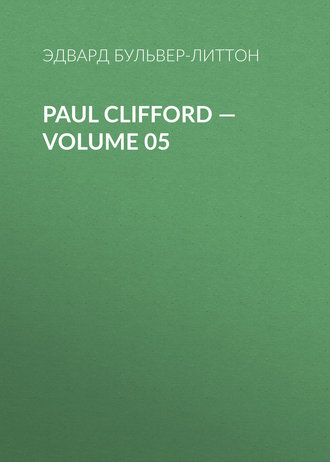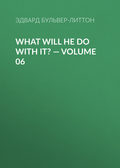
Эдвард Бульвер-Литтон
Paul Clifford — Volume 05
Short were Clifford's instructions to his followers, and so much do we do mechanically, that they were delivered with his usual forethought and precision. "You will leave the town instantly; go not, for your lives, to London, or to rejoin any of your comrades. Ride for the Red Cave; provisions are stored there, and, since our late alteration of the interior, it will afford ample room to conceal your horses. On the night of the second day from this I will join you. But be sure that you enter the cave at night, and quit it upon no account till I come!"
"Yes!" said he, when he was alone, "I will join you again, but only to quit you. One more offence against the law, or at least one sum wrested from the swollen hands of the rich sufficient to equip me for a foreign army, and I quit the country of my birth and my crimes. If I cannot deserve Lucy Brandon, I will be somewhat less unworthy. Perhaps—why not? I am young, my nerves are not weak, my brain is not dull,—perhaps I may in some field of honourable adventure win a name that before my death-bed I may not blush to acknowledge to her!"
While this resolve beat high within Clifford's breast, Lucy sadly and in silence was continuing with the squire her short journey to Bath. The latter was very inquisitive to know why Clifford had gone, and what he had avowed; and Lucy, scarcely able to answer, threw everything on the promised letter of the night.
"I am glad," muttered the squire to her, "that he is going to write; for, somehow or other, though I questioned him very tightly, he slipped through my cross-examination, and bursting out at once as to his love for you, left me as wise about himself as I was before: no doubt (for my own part I don't see what should prevent his being a great man incog.)this letter will explain all!"
Late that night the letter came. Lucy, fortunately for her, was alone in her room; she opened it, and read as follows:—
CLIFFORD'S LETTER
I have promised to write to you, and I sit down to perform that promise. At this moment the recollection of your goodness, your generous consideration, is warm within me: and while I must choose calm and common words to express what I ought to say, my heart is alternately melted and torn by thoughts which would ask words, oh how different! Your father has questioned me often of my parentage and birth,—I have hitherto eluded his interrogatories. Learn now who I am. In a wretched abode, surrounded by the inhabitants of poverty and vice, I recall my earliest recollections. My father is unknown to me as to every one; my mother,—to you I dare not mention who or what she was,—she died in my infancy. Without a name, but not without an inheritance (my inheritance was large,—it was infamy!), I was thrown upon the world. I had received by accident some education, and imbibed some ideas not natural to my situation; since then I have played many parts in life. Books and men I have not so neglected but that I have gleaned at intervals some little knowledge from both. Hence, if I have seemed to you better than I am, you will perceive the cause. Circumstances made me soon my own master; they made me also one whom honest men do not love to look upon; my deeds have been, and my character is, of a par with my birth and my fortunes. I came, in the noble hope to raise and redeem myself by gilding my fate with a wealthy marriage, to this city. I saw you, whom I had once before met. I heard you were rich. Hate me, Miss Brandon, hate me!—I resolved to make your ruin the cause of my redemption. Happily for you, I scarcely knew you before I loved you; that love deepened,—it caught something pure and elevated from yourself. My resolution forsook me; even now I could throw myself on my knees and thank God that you—you, dearest and noblest of human beings—are not my wife. Now, is my conduct clear to you? If not, imagine me all that is villanous, save in one point, where you are concerned, and not a shadow of mystery will remain. Your kind father, overrating the paltry service I rendered you, would have consented to submit my fate to your decision. I blush indignantly for him—for you—that any living man should have dreamed of such profanation for Miss Brandon. Yet I myself was carried away and intoxicated by so sudden and so soft a hope,—even I dared to lift my eyes to you, to press you to this guilty heart, to forget myself, and to dream that you might be mine! Can you forgive me for this madness? And hereafter, when in your lofty and glittering sphere of wedded happiness, can you remember my presumption and check your scorn? Perhaps you think that by so late a confession I have already deceived you. Alas! you know not what it costs me now to confess! I had only one hope in life,—it was that you might still, long after you had ceased to see me, fancy me not utterly beneath the herd with whom you live. This burning yet selfish vanity I tear from me, and now I go where no hope can pursue me. No hope for myself, save one which can scarcely deserve the name, for it is rather a rude and visionary wish than an expectation,—it is that under another name and under different auspices you may hear of me at some distant time; and when I apprise you that under that name you may recognize one who loves you better than all created things, you may feel then, at least, no cause for shame at your lover. What will you be then? A happy wife, a mother, the centre of a thousand joys, beloved, admired, blest when the eye sees you and the ear hears! And this is what I ought to hope, this is the consolation that ought to cheer me; perhaps a little time hence it will. Not that I shall love you less, but that I shall love you less burningly, and therefore less selfishly. I have now written to you all that it becomes you to receive from me. My horse waits below to bear me from this city, and forever from your vicinity. For ever!—-ay, you are the only blessing forever forbidden me. Wealth I may gain, a fair name, even glory I may perhaps aspire to,—to heaven itself I may find a path; but of you my very dreams cannot give me the shadow of a hope. I do not say, if you could pierce my soul while I write, that you would pity me. You may think it strange, but I would not have your pity for worlds; I think I would even rather have your hate,—pity seems so much like contempt. But if you knew what an effort has enabled me to tame down my language, to curb my thoughts, to prevent me from embodying that which now makes my brain whirl, and my hand feel as if the living fire consumed it; if you knew what has enabled me to triumph over the madness at my heart, and spare you what, if writ or spoken, would seem like the ravings of insanity, you would not and you could not despise me, though you might abhor.
And now Heaven guard and bless you! Nothing on earth could injure you. And even the wicked who have looked upon you learn to pray,—I have prayed for you!
Thus, abrupt and signatureless, ended the expected letter. Lucy came down the next morning at her usual hour, and, except that she was very pale, nothing in her appearance seemed to announce past grief or emotion. The squire asked her if she had received the promised letter. She answered, in a clear though faint voice, that she had,—that Mr. Clifford had confessed himself of too low an origin to hope for marriage with Mr. Brandon's family; that she trusted the squire would keep his secret; and that the subject might never again be alluded to by either. If in this speech there was something alien to Lucy's ingenuous character, and painful to her mind, she felt it as it were a duty to her former lover not to betray the whole of that confession so bitterly wrung from him. Perhaps, too, there was in that letter a charm which seemed to her too sacred to be revealed to any one; and mysteries were not excluded even from a love so ill-placed and seemingly so transitory as hers.
Lucy's answer touched the squire in his weak point. "A man of decidedly low origin," he confessed, "was utterly out of the question; nevertheless, the young man showed a great deal of candour in his disclosure." He readily promised never to broach a subject necessarily so unpleasant; and though he sighed as he finished his speech, yet the extreme quiet of Lucy's manner reassured him; and when he perceived that she resumed, though languidly, her wonted avocations, he felt but little doubt of her soon overcoming the remembrance of what he hoped was but a girlish and fleeting fancy. He yielded, with avidity, to her proposal to return to Warlock; and in the same week as that in which Lucy had received her lover's mysterious letter, the father and daughter commenced their journey home.
CHAPTER XXIV
Butler. What are these, sir?
Yeoman. And of what nature, to what use?
Latroc. Imagine.
The Tragedy of Rollo.
Quickly. He's in Arthur's bosom, if ever man went to Arthur's bosom.
Henry V.
The stream of our narrative now conducts us back to William Brandon. The law-promotions previously intended were completed; and to the surprise of the public, the envied barrister, undergoing the degradation of knighthood, had, at the time we return to him, just changed his toilsome occupations for the serene dignity of the bench. Whatever regret this wily and aspiring schemer might otherwise have felt at an elevation considerably less distinguished than he might reasonably have expected, was entirely removed by the hopes afforded to him of a speedy translation to a more brilliant office: it was whispered among those not unlikely to foresee such events, that the interest of the government required his talents in the house of peers. Just at this moment, too, the fell disease, whose ravages Brandon endeavoured, as jealously as possible, to hide from the public, had appeared suddenly to yield to the skill of a new physician; and by the administration of medicines which a man less stern or resolute might have trembled to adopt (so powerful and for the most part deadly was their nature), he passed from a state of almost insufferable torture to an elysium of tranquillity and ease. Perhaps, however, the medicines which altered also decayed his constitution; and it was observable that in two cases where the physician had attained a like success by the same means, the patients had died suddenly, exactly at the time when their cure seemed to be finally completed. However, Sir William Brandon appeared very little anticipative of danger. His manner became more cheerful and even than it had ever been before; there was a certain lightness in his gait, a certain exhilaration in his voice and eye, which seemed the tokens of one from whom a heavy burden had been suddenly raised, and who was no longer prevented from the eagerness of hope by the engrossing claims of a bodily pain. He had always been bland in society, but now his courtesy breathed less of artifice,—it took a more hearty tone. Another alteration was discernible in him, and that was precisely the reverse of what might have been expected. He became more thrifty, more attentive to the expenses of life than he had been. Though a despiser of show and ostentation, and far too hard to be luxurious, he was too scientific an architect of the weaknesses of others not to have maintained during his public career an opulent appearance and a hospitable table. The profession he had adopted requires, perhaps, less of externals to aid it than any other; still Brandon had affected to preserve parliamentary as well as legal importance; and though his house was situated in a quarter entirely professional, he had been accustomed to assemble around his hospitable board all who were eminent, in his political party, for rank or for talent. Now, however, when hospitality and a certain largeness of expenses better became his station, he grew closer and more exact in his economy. Brandon never could have degenerated into a miser; money, to one so habitually wise as he was, could never have passed from means into an object; but he had evidently, for some cause or another, formed the resolution to save. Some said it was the result of returning health, and the hope of a prolonged life, to which many objects for which wealth is desirable might occur. But when it was accidentally ascertained that Brandon had been making several inquiries respecting a large estate in the neighbourhood of Warlock, formerly in the possession of his family, the gossips (for Brandon was a man to be gossiped about) were no longer in want of a motive, false or real, for the judge's thrift.
It was shortly after his elevation to the bench, and ere these signs of change had become noticeable, that the same strange ragamuffin whom we have mentioned before, as introduced by Mr. Swoppem to a private conference with Brandon, was admitted to the judge's presence.
"Well," said Brandon, impatiently, the moment the door was closed, "your news?"
"Vy, your 'onor," said the man, bashfully, twirling a thing that stood proxy for a hat, "I thinks as 'ow I shall be hable to satisfy your vorship's 'onor.'! Then, approaching the judge and assuming an important air, he whispered, "'T is as 'ow I thought!"
"My God!" cried Brandon, with vehemence. "And he is alive,—and where?"
"I believes," answered the seemly confidant of Sir William Brandon, "that he be's alive; and if he be's alive, may I flash my ivories in a glass case, if I does not ferret him out; but as to saying vhere he be at this nick o' the moment, smash me if I can!"
"Is he in this country," said Brandon; "or do you believe that he has gone abroad?"
"Vy, much of one and not a little of the other!" said the euphonious confidant.
"How! speak plain, man; what do you mean?"
"Vy, I means, your 'oner, that I can't say vhere he is."
"And this," said Brandon, with a muttered oath,—"this is your boasted news, is it? Dog! damned, damned dog! if you trifle with me or play me false, I will hang you,—by the living God, I will!"
The man shrank back involuntarily from Brandon's vindictive forehead and kindled eyes; but with the cunning peculiar to low vice, answered, though in a humbler tone,—
"And vet good vill that do your 'oner? If so be as how you scrags I, will that put your vorship in the vay of finding he?"
Never was there an obstacle in grammar through which a sturdy truth could not break; and Brandon, after a moody pause, said in a milder voice,—
"I did not mean to frighten you! Never mind what I said; but you can surely guess whereabouts he is, or what means of life he pursues. Perhaps,"—and a momentary paleness crossed Brandon's swarthy visage,— "perhaps he may have been driven into dishonesty in order to maintain himself!"
The informant replied with great naivete that such a thing was not impossible! And Brandon then entered into a series of seemingly careless but artful cross-questionings, which either the ignorance or the craft of the man enabled him to baffle. After some time Brandon, disappointed and dissatisfied, gave up his professional task; and bestowing on the man many sagacious and minute instructions as well as a very liberal donation, he was forced to dismiss his mysterious visitor, and to content himself with an assured assertion that if the object of his inquiries should not already be gone to the devil, the strange gentleman employed to discover him would certainly, sooner or later, bring him to the judge.
This assertion, and the interview preceding it, certainly inspired Sir William Brandon with a feeling like complacency, although it was mingled with a considerable alloy.
"I do not," thought he, concluding his meditations when he was left alone,—"I do not see what else I can do! Since it appears that the boy had not even a name when he set out alone from his wretched abode, I fear that an advertisement would have but little chance of even designating, much less of finding him, after so long an absence. Besides, it might make me the prey to impostors; and in all probability he has either left the country, or adopted some mode of living which would prevent his daring to disclose himself!" This thought plunged the soliloquist into a gloomy abstraction, which lasted several minutes, and from which he started, muttering aloud,—
"Yes, yes! I dare to believe, to hope it. Now for the minister and the peerage!" And from that time the root of Sir William Brandon's ambition spread with a firmer and more extended grasp over his mind.
We grieve very much that the course of our story should now oblige us to record an event which we would willingly have spared ourselves the pain of narrating. The good old Squire of Warlock Manor-house had scarcely reached his home on his return from Bath, before William Brandon received the following letter from his brother's gray-headed butler:—
HONNURED SUR,—I send this with all speede, thof with a hevy bart, to axquainte you with the sudden (and it is feered by his loving friends and well-wishers, which latter, to be sur, is all as knows him) dangeros ilness of the Squire. He was seezed, poor deer gentleman (for God never made a better, no offence to your Honnur), the moment he set footing in his Own Hall, and what has hung rond me like a millston ever sin, is that instead of his saying, "How do you do, Sampson?" as was his wont, whenever he returned from forren parts, sich as Bath, Lunnun, and the like, he said, "God bless you, Sampson!" which makes me think sumhow that it will be his last wurds; for he has never spoke sin, for all Miss Lucy be by his bedside continual. She, poor deer, don't take on at all, in regard of crying and such woman's wurk, but looks nevertheless, for all the wurld, just like a copse. I sends Tom the postilion with this hexpress, nowing he is a good hand at a gallop, having, not sixteen years ago, beat some o' the best on 'un at a raceng. Hoping as yer Honnur will lose no time in coming to this "house of mourning," I remane, with all respect,
Your Honnur's humble servant to command,
JOHN SAMPSON.
[The reader, who has doubtless noticed how invariably servants of long standing acquire a certain tone from that of their master, may observe that honest John Sampson had caught from the squire the habit of parenthetical composition.]
Sir William Brandon did not give himself time to re-read this letter, in order to make it more intelligible, before he wrote to one of his professional compeers, requesting him to fill his place during his unavoidable absence, on the melancholy occasion of his brother's expected death; and having so done, he immediately set off for Warlock. Inexplicable even to himself was that feeling, so nearly approaching to real sorrow, which the worldly lawyer felt at the prospect of losing his guileless and unspeculating brother. Whether it be that turbulent and ambitious minds, in choosing for their wavering affections the very opposites of themselves, feel (on losing the fellowship of those calm, fair characters that have never crossed their rugged path) as if they lost, in losing them, a kind of haven for their own restless thoughts and tempest-worn designs!—be this as it may, certain it is that when William Brandon arrived at his brother's door, and was informed by the old butler, who for the first time was slow to greet him, that the squire had just breathed his last, his austere nature forsook him at once, and he felt the shock with a severity perhaps still keener than that which a more genial and affectionate heart would have experienced.







